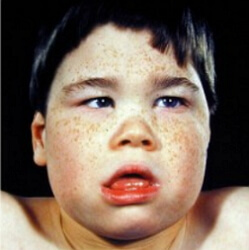Organic personality disorder
 Organic personality disorder is a persistent disruption of the brain, as a result of its disease, damage or dysfunction causing a significant change in the patient's behavior, decreased mental functions, mental exhaustion. Disorders are manifested in childhood and can give information about themselves throughout life. The course of the disease depends on age, the most dangerous are the critical periods, for example, the period of puberty, menopause.
Organic personality disorder is a persistent disruption of the brain, as a result of its disease, damage or dysfunction causing a significant change in the patient's behavior, decreased mental functions, mental exhaustion. Disorders are manifested in childhood and can give information about themselves throughout life. The course of the disease depends on age, the most dangerous are the critical periods, for example, the period of puberty, menopause.
And under favorable conditions, there can come a permanent compensation of the individual with retention of work capacity, and in case of negative influences( infectious diseases, organic disorders, emotional stress), decompensation may occur, in which psychopathic manifestations become pronounced. In general, the disease is chronic, in many cases the disease progresses, leading to complete social maladaptation, but with appropriate treatment, it is possible to improve the patient's condition. Very often patients avoid treatment, do not recognize the fact of the disease.
Symptoms and Diagnosis
To diagnose the disease, the following research methods are used: EEG, MRI, psychological methods( MMPI, Rorschach test, thematic apperceptive test).There is an organic violation of brain structures of various etiologies( illness, trauma or brain dysfunction), absence of disturbances in consciousness and memory, and manifestation of typical changes in the character of behavior and speech. But for a clear statement of the diagnosis, a long, at least half a year follow-up of the patient is necessary. During this period, the patient should show no less than three signs of organic personality disorder.
The signs are as follows:
- Inability to carry out activities, especially long, requiring concentration and strong-willed efforts. Especially if the receipt of the result of the activity is delayed or something does not work out;
- Expressed emotional instability, inability to self-control, large fluctuations in the manifestation of emotions, euphoria or complete apathy, uncontrolled manifestations of aggression, strong irritability;
- The disinhibition of low-lying drives. Ignoring social norms, stealing. Inadequate sexual behavior. Neglect of personal hygiene, sometimes gluttony.
- The emergence of paranoid concepts, unnatural suspicion. A focus on one abstract idea, for example, religious. Categorical assessments of someone else's behavior;
- An obvious change in speech( hypergraphy, viscosity);Changes in sexual preferences, sometimes hypersexuality.
Although at the initial stages of the disease, memory changes are usually not observed, with the progression of the disease there may be memory disorders, and this allows us to talk about dementia.
Causes of
Because of the large number of damaging factors, from birth injuries to radiation, organic disorders are very common.
The main causes of the appearance of disorders are:
- Craniocerebral head injuries and repeated trauma, especially damage to the temporal or frontal lobe;
- Infectious brain damage;
- Diseases of the brain( multiple sclerosis, swelling);
- Vascular diseases( subarachnoidal hematomas);
- Cerebral palsy;
- Encephalitis with subsequent somatic disorders( postencephalic parkinsonism);
- Chronic poisoning with manganese;
- The use of psychoactive substances( alcohol, stimulants, steroids, hallucinogens);
- Temporal epilepsy.
In patients over 10 years old suffering from epilepsy, an organic personality disorder develops, it is assumed that there is a correlation between the frequency of seizures and the degree of impairment. Despite the fact that organic personality disorders have been studied since the end of the previous century, the features of the formation and development of symptoms still remain unclear. There is no convincing data on the influence of biological and social factors on this process. As the main pathogenetic link, brain lesions of exogenous origin are considered, leading to a violation of the correct correlation between the processes of excitation and inhibition in the brain. In recent years, the integrative approach to identifying the pathogenesis of mental disorders is considered to be the most correct. This approach involves the following factors: genetic, organic, socio-psychological. However, there was no substantive analysis on this issue. The study of organic disorders, the cause of which is a traumatic brain injury, has always been given a lot of attention, while the violations that result from the transferred neuroinfections, vascular diseases, intoxications remain poorly understood.
Treatment of organic disorders
To treat the disorder was effective, it must necessarily be comprehensive. A combination of psychotherapeutic and medicamental influences is necessary, which, with skillful application, strengthen the influence of each other.
Drug therapy involves the use of several types of drugs:
-
( dazepam, elenium, phenazipam, oxazepam) anti-anxiety drugs that improve well-being. Since these drugs are often addictive and addictive, they are administered with caution;
- Antidepressants( amitriptyline, clomipramine) are used in the development of depression and exacerbation of obsessive-compulsive disorder;
- Neuroleptics( levomepromazine, trifazin, eglonil, haloperidol) are prescribed for aggressive behavior, with exacerbation of paranoid disorder, psychomotor agitation;
- Nootropics( nootropil, phenibut, aminalon);
- Hormones, lithium, anticonvulsants. However, drugs often only affect the symptoms of the disease and after the drug is discontinued the disease progresses again.
The main purpose of the application of psychotherapeutic methods is to alleviate the psychological condition of the patient, help in overcoming depression, sexual problems, obsessive fears, and assimilation of new patterns of behavior. Help is provided in the presence of both mental and physical problems, in the form of a conversation or a series of exercises. Psychotherapeutic impact involves the use of group, individual, family therapy, which will allow the patient to build the right relationship with family members, as well as provide him with emotional support of relatives. In addition, psychotherapy will allow family members to learn the rules of behavior and communication with the patient. The main effect, if possible, should be directed to the organic cause of the disease. And of course, you need to strive to minimize harmful effects( alcohol).Most often, only patients with a severe course of the disease fall into the psychiatrist's field of vision, but the patient's placement in a psychiatric hospital is not always required, only if he is dangerous to others or to himself. Prevention of organic disorders begins with adequate obstetrics and rehabilitation in the postnatal period. Of great importance is proper upbringing in school and family.



